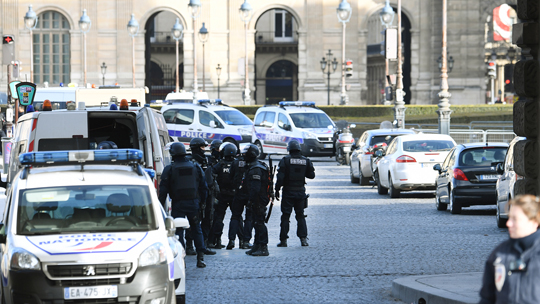Paris, Feb 3: A machete-wielding man who yelled "Allahu Akbar" was shot and injured as he attacked security forces at the Louvre museum in Paris today, police said.

One soldier was injured in the assault by the knifeman who was shot five times and is alive despite his serious injuries.
Two backpacks he was carrying did not contain explosives, city police chief Michel Cadot said.
Prime Minister Bernard Cazeneuve called the attack "terrorist in nature" after the incident which led streets around the world-famous museum to be sealed off.
The shooting comes with France on its highest state of alert with thousands of troops patrolling the capital following a string of attacks in the last few years.
Soldiers in uniform carrying automatic rifles are regularly seen walking in the area around the Louvre, which is one of the main tourist attractions in Paris, drawing millions of visitors every year.
The huge former royal palace in the heart of the city is home to the Mona Lisa and other renowned works of art but also a shopping complex and numerous exhibition spaces.
"The people who were in the museum -- there were about 250 of them -- were held at a distance and confined in secure areas of the Louvre," Cadot said.
"We will start taking them out in small groups."
France has suffered a string of attacks in recent years, beginning in January 2015 when jihadist gunmen killed journalists at the Charlie Hebdo satirical newspaper in Paris.
Another attacker went on to kill shoppers in a Jewish supermarket, with a total of 17 people dead in three days of bloodshed.
Ten months later, gunmen and suicide bombers from the Islamic State jihadist group attacked bars, restaurants, a concert hall and the national stadium in Paris on November 13, 2015, killing 130 people.
And last July, a Tunisian extremist rammed a lorry through crowds celebrating Bastille Day in Nice on France's south coast, crushing 86 people to death.
In November, French police broke up an alleged jihadist terror ring which was thought to be planning to attack Paris.
The Louvre was already suffering from a fall in visitor numbers after the series of attacks in France.
Over the last two years, numbers are down about two million, casting doubt on its claim to be the most visited museum in the world.
Last year, there was a 15-per cent slump in visitors compared to 2015, to around 7.3 million.






Comments
Add new comment